News & Updates
Lotus - A trusted name in family travel
Chinese New Year celebrations were born out of fear and myth. Legend spoke of the wild beast Nian (which also is the word for "year") that appeared at the end of each year, attacking and killing villagers. Loud noises and bright lights were used to scare the beast away, and the Chinese New Year celebrations were born.
Days of Chinese New Year Festival
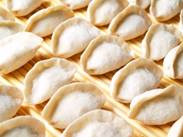 Chinese New Year Eve is the day of family reunion. People in the north eat dumplings on this night while people in the south eat “Nian Gao” (meaning Year Cake). In the northern part of China, people will put a coin in one dumpling when making dumpling and the one who, by chance, eat this dumpling will have good luck in the coming year. The shape of a dumpling is like a gold ingot, and the pronunciation of Nian Gao in Chinese means “keeping promoting to a higher position”. Both of them are signs of good luck and happiness.
Chinese New Year Eve is the day of family reunion. People in the north eat dumplings on this night while people in the south eat “Nian Gao” (meaning Year Cake). In the northern part of China, people will put a coin in one dumpling when making dumpling and the one who, by chance, eat this dumpling will have good luck in the coming year. The shape of a dumpling is like a gold ingot, and the pronunciation of Nian Gao in Chinese means “keeping promoting to a higher position”. Both of them are signs of good luck and happiness.
People in the north are used to having this dinner at home while people in the south like to have this dinner at a restaurant. So, a tip: if you want to celebrate the Chinese New Year’s Eve in the 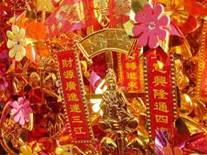 southern part of China, make sure you make a reservation in a restaurant ahead of time, or every restaurant will be full.
southern part of China, make sure you make a reservation in a restaurant ahead of time, or every restaurant will be full.
The happiest moment is when elder members of the family give red envelopes to children as a Lunar New Year gift. During the whole night, all family members will stay up to watch and usher in the New Year. Children like to go out and set off firecrackers. However, adults usually stay at home, chatting, playing cards, playing Mahjong and enjoying reunion with family. Since 1982 when the CCTV New Year’s Gala was first broadcast four hours before the beginning of the New Year, watching the CCTV New Year’s Gala has become an important event for Chinese people on 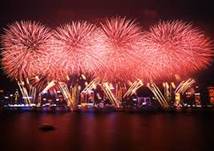 New Year’s Eve.
New Year’s Eve.
The sound of firecrackers and fireworks tells people that the New Year has arrived. People offer the New Year's greetings while they are watching TV shows, enjoying the fireworks or gambling. They have to send greetings to parents or eldest members in the house first, then to siblings. The most popular greeting is Gong Xi Fa Chai ![]() (Cantonese pronounces Gong Hay Fat Choy), which means "congratulations and make a fortune." The firecracker and congratulations greeting are from the story of the animal Nian. "Make a fortune" is to wish people rich, because Chinese love to talk about money.
(Cantonese pronounces Gong Hay Fat Choy), which means "congratulations and make a fortune." The firecracker and congratulations greeting are from the story of the animal Nian. "Make a fortune" is to wish people rich, because Chinese love to talk about money.
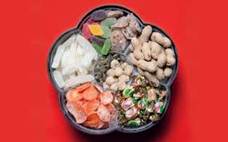 After dawn, it's time to say Chinese New Year greetings to neighbors, friends,
After dawn, it's time to say Chinese New Year greetings to neighbors, friends,  coworkers, and relatives. In the morning, all the children are supposed to wear new clothes, pants, shoes, hat or jacket. Every family should prepare many different kinds of sweet candies in a tray for people visiting their houses. If a child goes with adult to visit someone and says Gong Xi Fa Chai, he can receive a Red Envelope.
coworkers, and relatives. In the morning, all the children are supposed to wear new clothes, pants, shoes, hat or jacket. Every family should prepare many different kinds of sweet candies in a tray for people visiting their houses. If a child goes with adult to visit someone and says Gong Xi Fa Chai, he can receive a Red Envelope.
The second day of Chinese New Year is the Son-in-Law Day. Married women return their mother’s homes on this day. The husband must escort his 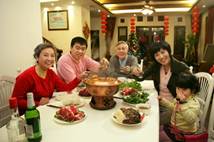 newlywed wife to see parents-in-law. Certainly, the married woman needs to prepare Red Envelopes for her parents, nephews and nieces. The lunch time is their reunion dinner. The married couple will leave after 3:00 PM. Long ago, married women would bring back a pair of sugar cane and a pair of chickens. Sugar cane stands for the sweet married life. The chickens would represent many children.
newlywed wife to see parents-in-law. Certainly, the married woman needs to prepare Red Envelopes for her parents, nephews and nieces. The lunch time is their reunion dinner. The married couple will leave after 3:00 PM. Long ago, married women would bring back a pair of sugar cane and a pair of chickens. Sugar cane stands for the sweet married life. The chickens would represent many children.
The third day is the Mice Wedding Day or also known as the Red Dog Day according to the Chinese farmer’s calendar. The Red Dog is the name of the God of Anger, who brings bad luck to people. So, people don’t like to go out on this day. After two days of celebrating, eating, drinking playing and gambling, many people are tired and might stay up very late, so it is a good excuse for people to go to bed early. It is also important to have a dark night because this night is the Mice’s Wedding Day and if it is dark, the mice will have difficulty to make the wedding, which will slow their breeding. In the old fashioned farming society, people will leave a few bits of cake or rice in the corner of the room for the mice at night.
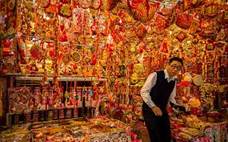 The fourth day of Chinese New Year is the Welcome Home Day to the God of the Stove. The fifth day of Chinese New Year is the Welcome God of Wealth Day. Lots of businesses and stores like to reopen on this day.
The fourth day of Chinese New Year is the Welcome Home Day to the God of the Stove. The fifth day of Chinese New Year is the Welcome God of Wealth Day. Lots of businesses and stores like to reopen on this day.
The sixth day of Chinese New Year is the Clear-Water Master Day. The seventh day of Chinese New Year is The Human Day. The eighth day of Chinese New Year is The Completion Day. The ninth day of Chinese New Year is the Birthday of Jade Emperor, King of Heaven. The tenth day of Chinese New Year is The Eating Day. The eleventh day of Chinese New Year is The Break Day. The twelfth day of Chinese New Year is The Diarrhea Day. The 13th day of Chinese New Year is The Death Anniversary of Kuan Yu. The 14th day of Chinese New Year is The Lantern Decoration 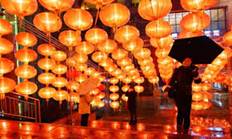 Day. The 14th day is spent getting ready for the Lantern Festival on the 15th night. On the fifteenth day, when the moon is full, the Lantern Festival is held. As part of the festivities, children carry lanterns in a nighttime parade. The 15th day of Chinese New Year is The Lantern Festival. The Chinese New Year Festival will end at Chinese Lantern Festival. But the displays of lantern shows will last for another 20 to 30 days.
Day. The 14th day is spent getting ready for the Lantern Festival on the 15th night. On the fifteenth day, when the moon is full, the Lantern Festival is held. As part of the festivities, children carry lanterns in a nighttime parade. The 15th day of Chinese New Year is The Lantern Festival. The Chinese New Year Festival will end at Chinese Lantern Festival. But the displays of lantern shows will last for another 20 to 30 days.
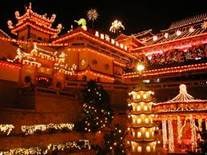 Though the festival does not last as long in North America Asian communities, as it does in rural or even metropolitan China, it is useful to know the background of some of these traditional days.
Though the festival does not last as long in North America Asian communities, as it does in rural or even metropolitan China, it is useful to know the background of some of these traditional days.
The source of Chinese New Year is itself centuries old and gains significance because of several myths and traditions. Traditionally, the festival was a time to honor deities as well as ancestors. Legend holds that the Chinese New Year began with a battle against a mythical beast called the Nian, who would come on the first day of the New Year to eat children, livestock, and crops. In order to protect themselves from the Nian, villages put food in front of their doors believing that the creature would eat that and leave everything else alone. It was believed that the Nian was afraid of the color red and firecrackers, so people would hang red lanterns outside and set off firecrackers.
While traditional celebrations continue, this year marks a new twist on centuries old traditions, with officials encouraging people to cut down on causing air pollution by limiting or eliminating firecracker celebrations on Chinese New Year Eve. Interesting twist impinging on an old tradition… after centuries of celebrations, isn’t it?
Sources: Huffington Post; Chinesenewyeardays; Infoplease; Chinesecalendar; Wikipedia; CNN; and Publicholidays.com